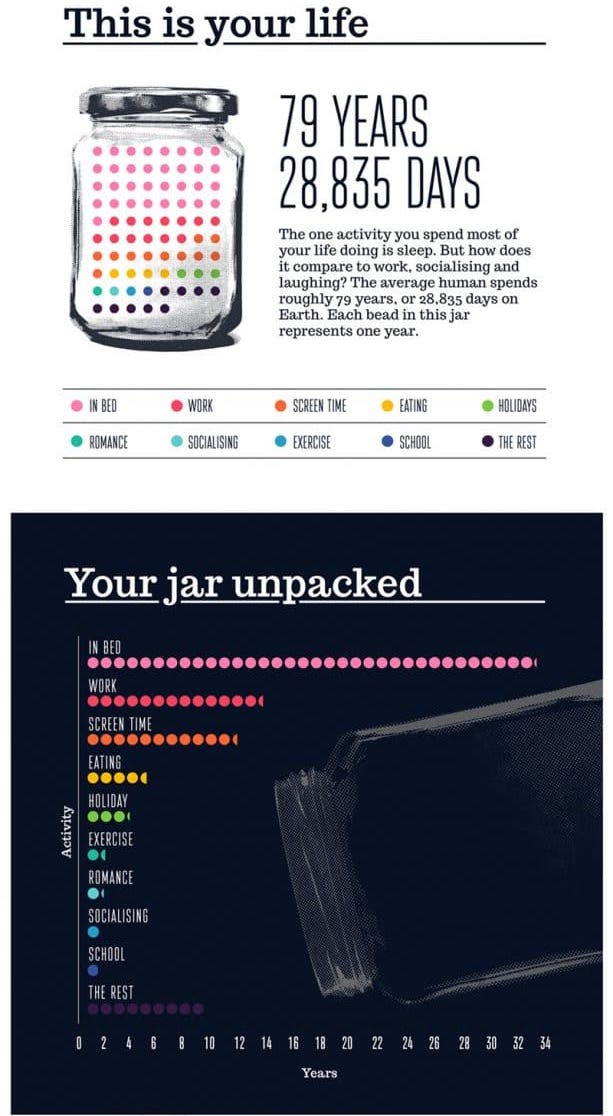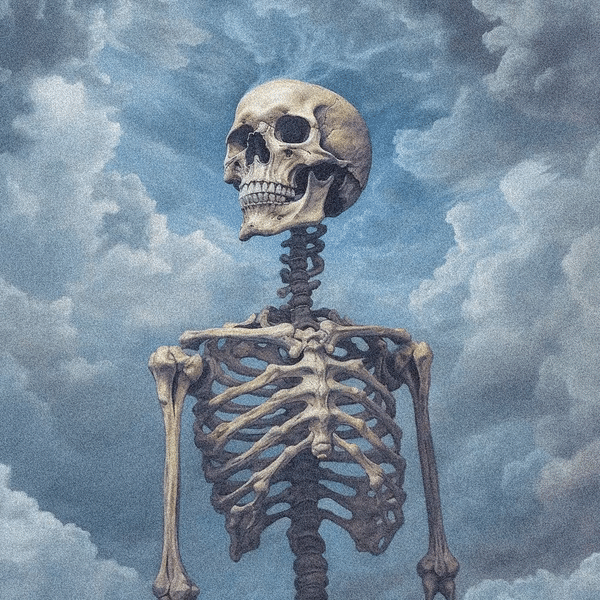Time Is A Funny Thing.
Hey! Thank you for tuning in :)
So I came across this interesting graphic the other day illustrating visually how our lives are broken up into various components:
Of course, this is compiled from an assortment of averages, so it’s far from a definitive guide, not to mention it’s not totally accurate (we don’t actually spend just one year of our life in school, nor do we spend just one year socializing). Still, it’s somewhat relevant for providing a general outline of how we tend to allocate our time and, more importantly, for illustrating just how little time we have after it’s distributed amongst our daily activities.*
But sharing these facts is not why I’m writing this.
I’m hitting “milestone” ages and really evaluating my place in life. I’ve been plagued with the feeling of “not falling behind” at any cost, and honestly, it’s an unhealthy mindset to have. Life is not a race, and everyone hits their stride at different points. While I do recognize this, it is difficult to take to heart. There seems to be so much pressure to follow a traditional path and timeline: get a white collar job, and work 40+ hours a week for 40 years. Of course, I don’t fault anyone that does choose to take this route for any reason, but it’s not the mold that I fit in.
This reflecting is leading me to realize how short life can be, yet also how long it can seem to stretch out. Time is a funny thing. Allow me to provide some context: due to some circumstances in high school, I had the opportunity to graduate early and finish my bachelor’s degree two years ahead of my peers, at the age of 20 (which I did end up doing). Two years later, I’m now 22 and haven’t yet done anything worthwhile with my degree, which essentially negates the headstart I had.
In other words, before, I was able to look at my life path with relative clarity: graduate school by 18, possibly go to college and finish by 22, have a serious relationship by 26, have kids by 32, hopefully retire early at 55-60. But the more I contemplated it, the more I began to realize that that wasn’t MY life- it was the life that I was supposed to follow, the life of normalcy. But this path is simply not for me (as has already been evidenced by my unorthodox academic trajectory). And I am really beginning to come to terms with this.
Now, when I try to imagine my future, all I see is a thick, gray mist. I can’t see past 10 feet in front of me. I have no idea where I’ll be in life by the end of the year. What I do know is that while I’m comfortable, I’m not fully satisfied. The jobs I have now pay enough for what I need, but they do not fulfill me in a personal sense. And it scares me to think that I’ll never get beyond the fog out of an aversion of sheer discomfort.
I’ve done some hard soul-searching and asked myself what it is I really want out of life and how I want to make an impact (and of course a living), and I believe I’ve found a calling. This newsletter has dragged on long enough already, so you’ll just have to wait for an explanation another time. :P
So I guess that this is kind of turned into a venting/confession of sorts. But my original point still stands: truly, deeply recognize and acknowledge the brevity of life, and ask yourself what you want most from it and how you can set out to attain it. We may only have one shot at this, so I really think it’s in all of our best interests to make it count.
After all, it’s as long or short, as worthwhile or monotonous as you make it to be.
actionable prompt:
Identify how you tend to spend your time day to day. A helpful way to do this is to keep a journal and track how you divide your time between sleep, work, errands, cooking/eating, duties, and especially leisure. Determine if you are content with how your time is used and make any amendments as you see fit.
For example, going to the grocery store once a week and spending an afternoon meal prepping can save you a ton of time that you can then allocate to other areas of your life. If you seek to make your leisure time more constructive, set limits for the your cheap dopamine hits (such as social media) and devote the remainder to self-actualizing activities, such as reading, journaling, or engaging in something creative.
Thanks for reading,
Alan
*Interestingly enough, while I was editing this newsletter, I was listening to Jay Shetty’s podcast when this exact topic came up. These were his figures:
The average person lives for 75 years. In that lifespan we spend:
26 years sleeping, 11 years watching TV/streaming platforms, eight years shopping, six years online/social media (with this number only continuing to grow), and seven years lying awake in bed tossing and turning trying to sleep. Here’s another interesting fact: we spend 93% of our life indoors.
After all our social and biological duties are taken into account, we are left with eight or nine years of time that we can spend on ourselves (self-actualizing, taking courses, doing self-care, going on trips, etc.)
(if you enjoyed this and found this valuable, please consider buying me a coffee :). also share and spread the word to those who you think would like this!)
additional resources
The time management episode of Jay Shetty’s podcast that I mentioned earlier.






